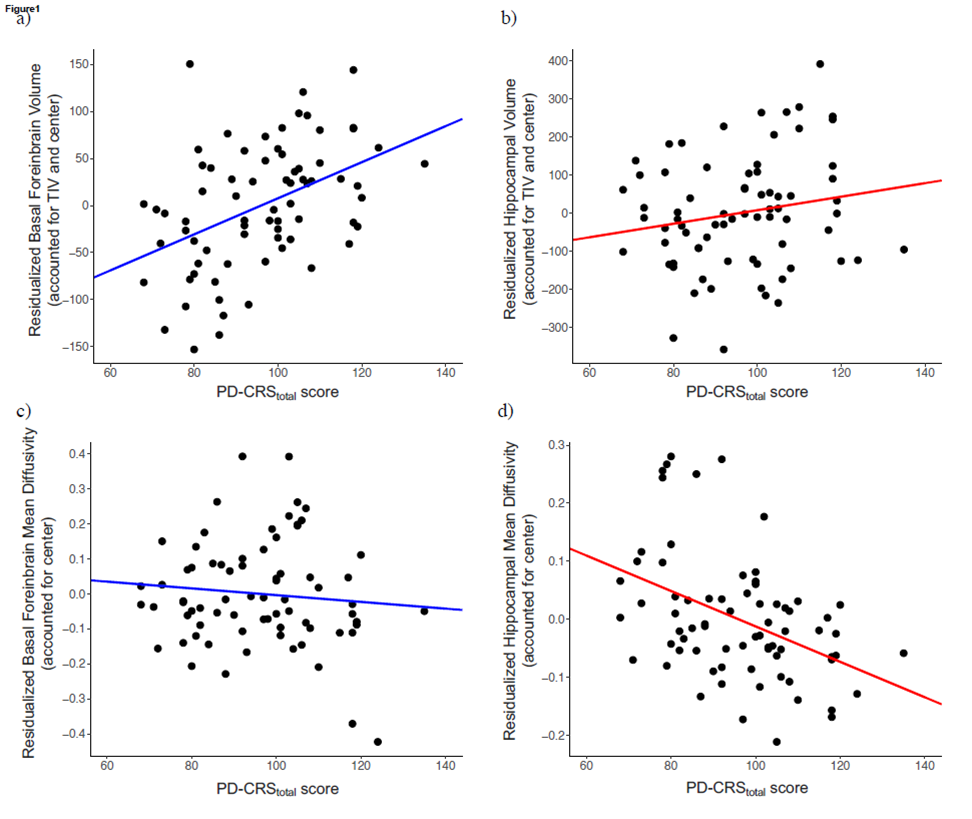Category: Parkinson's Disease: Neuroimaging
Objective: To assess associations between multimodal neuroimaging measures of cholinergic basal forebrain (CBF) integrity and cognition in a well-characterized multicentric cohort of Parkinson’s disease (PD) patients without dementia.
Background: Pronounced atrophy of the CBF is an established neuropathologic feature of dementia in PD, but the degree to which CBF degeneration also relates to more subtle cognitive deficits that emerge in the pre-dementia phase of PD is less well known.
Method: The study included a total of 180 non-demented PD patients and 45 healthy controls, who underwent structural MRI acquisitions and standardized neurocognitive assessment through the PD-Cognitive Rating Scale (PD-CRS) within the multicentric COPPADIS-2015 study. A subset of 73 patients also had Diffusion Tensor Imaging acquisitions. Volumetric and microstructural (mean diffusivity, MD) indices of CBF degeneration were automatically extracted using a stereotactic CBF atlas. For comparison, we also assessed multimodal indices of hippocampal degeneration. Associations between imaging measures and cognitive performance were assessed using linear regression models controlled for acquisition site and total intracranial volume (for volumetric measures), and additional models further controlled for age, sex, education, and motor symptom severity (UPDRS-III scores).
Results: Compared to controls, CBF volume was not significantly reduced in PD patients as a group. However, across PD patients lower CBF volume was significantly associated with lower global cognition (PD-CRStotal: r=0.37, p<0.001; Fig. 1a), and this association remained significant in the fully covariate-controlled model (p=0.003). Analysis of individual PD-CRS item scores showed that this association spanned executive and memory domains. No analogue cognition associations were observed for CBF MD (Fig. 1c). In fully covariate-controlled models, hippocampal volume was not associated with cognition in PD (Fig. 1b), but there was a significant association for hippocampal MD (p=0.042; Fig. 1d).
Conclusion: Early cognitive deficits in PD without dementia are more closely related to structural MRI measures of CBF degeneration than hippocampal degeneration. DTI-based diffusion measures were inferior to standard volumetric assessments for capturing cognition-relevant CBF changes in non-demented PD.
To cite this abstract in AMA style:
MJ. Grothe, MA. Labrador-Espinosa, S. Jesús, D. Macías-García, A. Adarmes-Gómez, F. Carrillo, E. Iglesias Camacho, P. Franco-Rosado, F. Roldán Lora, JF. Martín-Rodríguez, M. Aguilar Barberá, P. Pastor, S. Escalante Arroyo, B. Solano Vila, A. Cots Foraster, J. Ruiz Martínez, F. Carrillo Padilla, M. Pueyo Morlans, I. González Aramburu, J. Infante Ceberio, J. Hernández Vara, O. de Fábregues-Boixar, T. Deus Fonticoba, B. Pascual-Sedano, J. Kulisevsky, P. Martínez-Martín, D. Santos-García, P. Mir. In-vivo cholinergic basal forebrain degeneration and cognition in Parkinson’s disease: imaging results from the COPPADIS study [abstract]. Mov Disord. 2021; 36 (suppl 1). https://www.mdsabstracts.org/abstract/in-vivo-cholinergic-basal-forebrain-degeneration-and-cognition-in-parkinsons-disease-imaging-results-from-the-coppadis-study/. Accessed July 5, 2025.« Back to MDS Virtual Congress 2021
MDS Abstracts - https://www.mdsabstracts.org/abstract/in-vivo-cholinergic-basal-forebrain-degeneration-and-cognition-in-parkinsons-disease-imaging-results-from-the-coppadis-study/

